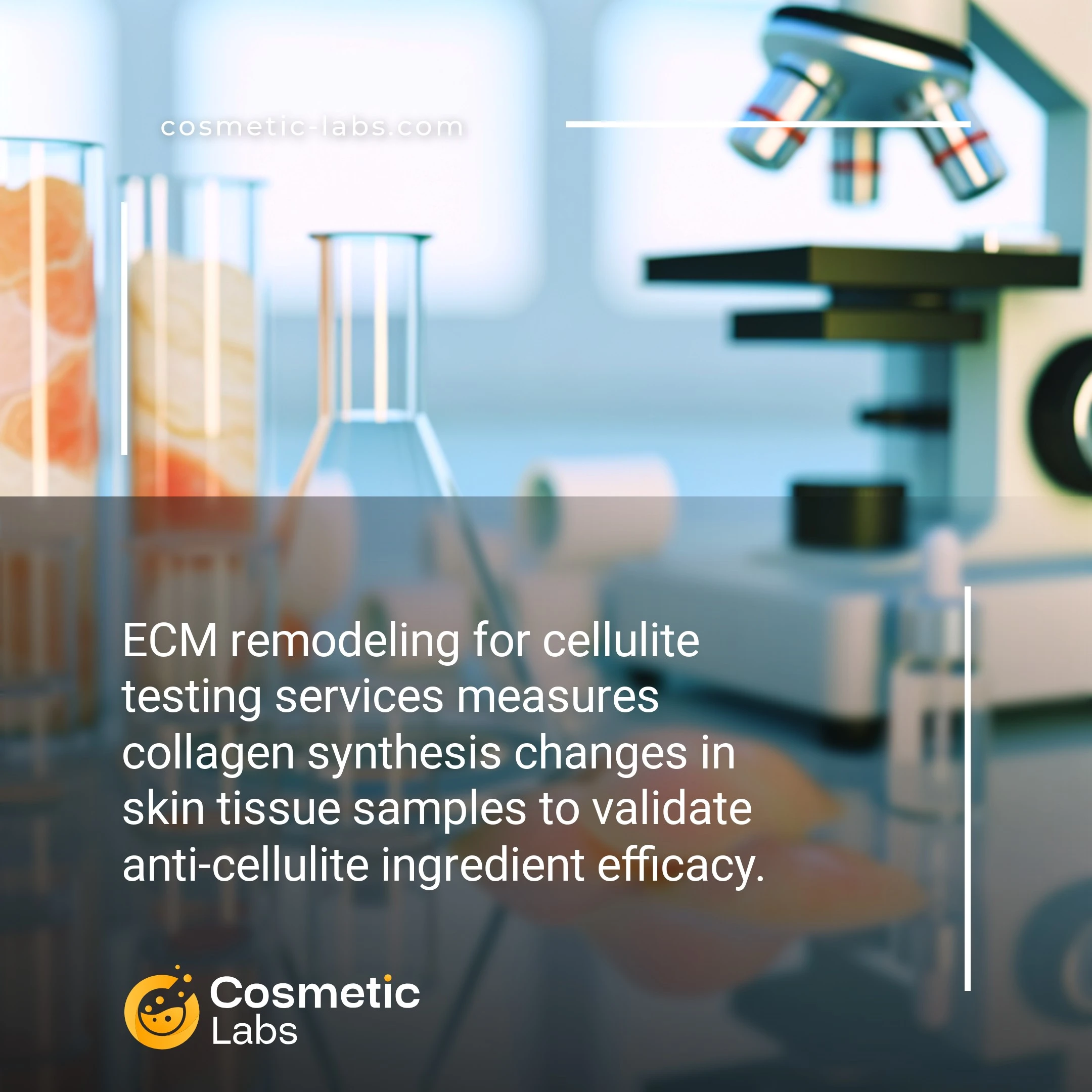ECM Remodeling Cellulite Testing Services for Cosmetic Brands

What is ECM remodeling?
ECM remodeling for cellulite testing services evaluates how cosmetic ingredients affect the extracellular matrix structure in skin tissue associated with cellulite formation. Labs measure changes in collagen synthesis, elastin fiber organization, and hyaluronic acid distribution using 3D tissue models and molecular analysis techniques. This testing reveals whether your anti-cellulite formulations actually strengthen dermal architecture or just provide temporary surface effects—data that’s needed for substantiated marketing claims.
Why do you need this service?
Cosmetic labs use ECM remodeling assays to validate anti-cellulite ingredient claims before market launch, measuring collagen synthesis and elastin production in dermal tissue models. These tests help brands demonstrate measurable skin firmness improvements for regulatory submissions and marketing claims, while identifying optimal active concentrations that deliver visible results without causing irritation.
Who provides ECM remodeling services?
All cosmetic labs providing ECM remodeling services
There is no company providing these services at the moment.
ECM Remodeling Testing for Cellulite Treatment Validation
Extracellular matrix remodeling represents a key mechanism in cellulite treatment efficacy, making it a critical testing parameter for anti-cellulite product development. Labs specializing in cellulite preclinical testing offer ECM remodeling assays that measure how formulations affect collagen synthesis, elastin production, and matrix metalloproteinase activity in dermal tissue models.
Collagen and Elastin Synthesis Measurement
Testing facilities evaluate your product’s ability to stimulate collagen type I and III production using fibroblast cell cultures and tissue explants. These assays measure hydroxyproline content and procollagen peptide levels to quantify collagen synthesis rates. Labs also assess elastin fiber formation through immunofluorescence staining and biochemical analysis.
Key testing parameters include:
- Collagen synthesis rates at 24, 48, and 72-hour intervals
- Elastin production quantification via desmosine analysis
- Fibronectin and hyaluronic acid expression levels
- Cell viability and proliferation markers
Matrix Metalloproteinase Activity Analysis
Labs measure MMP-1, MMP-2, and MMP-9 enzyme activity to determine how your formulation affects collagen breakdown pathways. Zymography techniques and ELISA-based assays quantify metalloproteinase inhibition levels, while RT-PCR analysis measures gene expression changes in treated versus control samples.
Testing protocols typically include:
- Baseline MMP activity measurement in untreated controls
- Dose-response curves for active ingredients
- Time-course studies over 7-14 day periods
- Comparative analysis against reference compounds
Connect with verified labs on our platform to discuss ECM remodeling testing protocols specific to your cellulite treatment formulation needs.
Practical Applications of ECM Remodeling Testing for Cellulite Treatments
Cosmetic labs use ECM remodeling testing for cellulite applications to validate how active ingredients affect collagen synthesis, elastin production, and dermal matrix restructuring in cellulite-affected tissue models.
Anti-Cellulite Formulation Development
Labs evaluate peptide complexes, botanical extracts, and lipolytic compounds through ECM remodeling assays to measure their impact on dermal thickness and fiber organization. Collagen type I and III expression levels serve as primary endpoints, with testing protocols typically running 14-28 days using 3D tissue models or ex-vivo skin samples.
Teams assess matrix metalloproteinase (MMP) activity and hyaluronic acid synthesis to determine how formulations influence skin elasticity and firmness. Results guide ingredient concentration optimization and combination strategies for maximum ECM restructuring benefits.
| ECM Marker | Testing Method | Typical Timeline | Key Measurement |
|---|---|---|---|
| Collagen I/III | Immunofluorescence | 14-21 days | Fiber density increase |
| Elastin fibers | Histological staining | 21-28 days | Network organization |
| MMP-1 activity | Enzymatic assay | 7-14 days | Degradation inhibition |
| Hyaluronic acid | ELISA quantification | 14-21 days | Synthesis enhancement |
Clinical Claims Substantiation
Brands use ECM remodeling data to support marketing claims about skin tightening, dimpling reduction, and texture improvement. Labs generate dose-response curves and time-course studies that demonstrate measurable changes in dermal architecture parameters.
Testing protocols include mechanical property assessments alongside biochemical markers to validate claims about improved skin elasticity and firmness. Documentation packages typically include histological images, quantitative analysis reports, and statistical validation for regulatory submissions.
Ready to validate your cellulite treatment formulations? Contact specialized cosmetic labs on our platform to discuss ECM remodeling testing protocols tailored to your product development needs.
